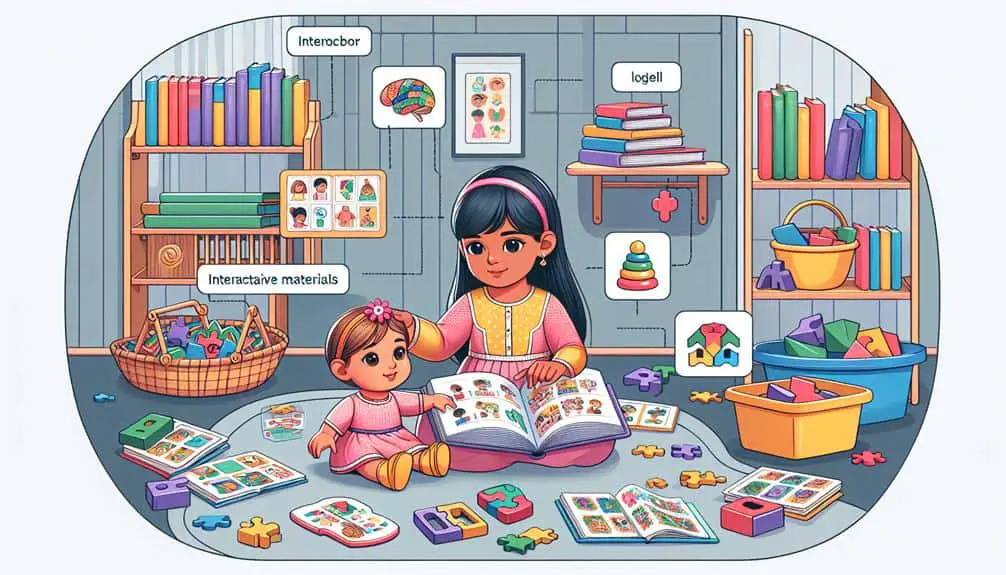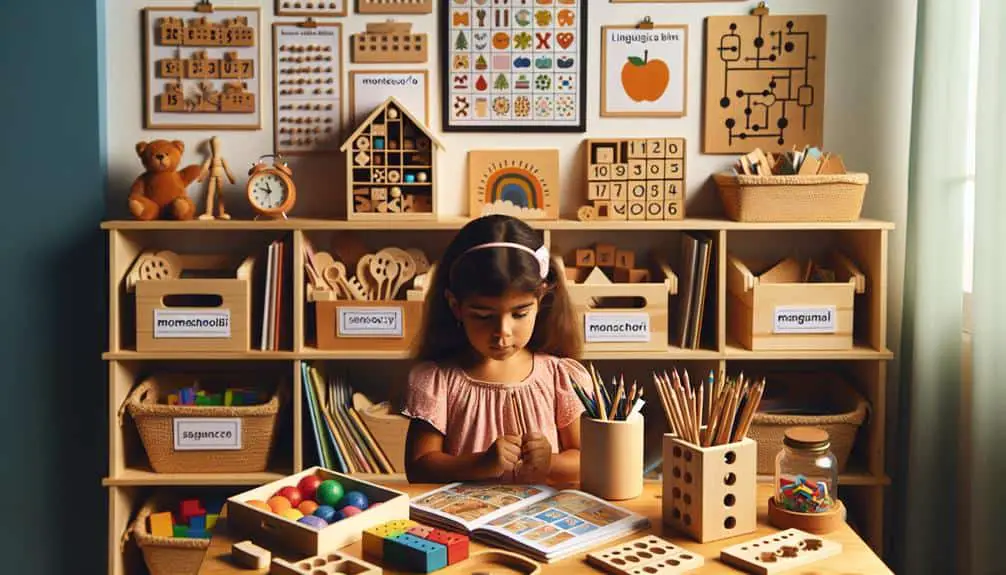To boost language skills, immerse your child in bilingual environments early on. Reading aloud fosters love for language and builds vocabulary. Engage in conversations to enhance communication and listening abilities. Music and rhymes aid in cognitive development and pronunciation. Educational apps offer interactive ways to learn grammar and comprehension. Follow these strategies for a well-rounded approach to language development.
Key Points
- Language immersion in bilingual households
- Reading aloud and parent involvement
- Encouraging conversations and storytelling
- Incorporating music and rhymes
- Utilizing educational apps and games
Importance of Early Language Exposure
Early language exposure plays a pivotal role in shaping a child's linguistic abilities and overall cognitive development. Language immersion, particularly in bilingual households, offers numerous cognitive benefits. Children exposed to multiple languages from a young age tend to have better problem-solving skills, enhanced creativity, and improved multitasking abilities.
Research has shown that bilingual children often reach language milestones at a similar pace to monolingual children, dispelling the myth that learning multiple languages may cause delays in language development. In fact, the cognitive advantages gained through early exposure to different languages can positively impact a child's academic performance and future career opportunities.
Reading Aloud to Your Child
Reading aloud to your child is a highly effective strategy for promoting language development and nurturing a love for literature. Parent involvement in reading activities plays an essential role in enhancing a child's language immersion and vocabulary building.
Interactive reading sessions where parents engage their children by asking questions, discussing the story, and encouraging predictions can greatly impact language development. Through reading aloud, children are exposed to a variety of words, sentence structures, and storytelling techniques, all of which contribute to expanding their vocabulary and language comprehension skills.
Research has shown that children who are read to regularly tend to have larger vocabularies and better language skills compared to those who are not. Additionally, the emotional bond formed during shared reading experiences can foster a positive attitude towards books and learning.
Encouraging Conversations and Storytelling
Engaging in conversations and storytelling with your child is a powerful method for enhancing language development and fostering communication skills. When you engage in conversations, you provide opportunities for vocabulary building and encourage active listening.
By actively listening to your child, you not only show them that their words are valued but also help them expand their vocabulary by introducing new words and concepts.
Storytelling techniques can also greatly benefit language development. When telling stories, try to incorporate open-ended questions to encourage your child to think critically and creatively. This not only aids in language comprehension but also enhances their expressive language skills as they formulate responses.
Additionally, storytelling can spark imagination and curiosity, further enriching their language abilities.
Incorporating Music and Rhymes
Utilizing music and rhymes in your interactions with your child can greatly enhance their language development and cognitive skills. Musical activities have been shown to play an important role in language acquisition. Singing songs, listening to music, and playing musical games can help your child improve their vocabulary, sentence structure, and even their pronunciation.
Music engages multiple areas of the brain simultaneously, which can strengthen neural connections related to language processing.
Rhyme games are another excellent way to boost language skills. Engaging in activities that involve rhyming words helps children develop phonological awareness, which is essential for reading and spelling. Rhymes make language fun and memorable, aiding in vocabulary building. Encouraging your child to create their own rhymes or sing along to rhyming songs can be a creative and effective way to enhance their language abilities.
Incorporating music and rhymes into your daily interactions with your child can't only make learning language more enjoyable but also contribute significantly to their overall language development.
Utilizing Educational Apps and Games
Incorporating educational apps and games into your child's daily routine can effectively enhance their language development and cognitive skills. Interactive engagement through digital learning platforms offers a dynamic way for children to engage with language concepts in a fun and engaging manner.
These apps and games are designed to stimulate various aspects of language development, such as vocabulary building, grammar, and comprehension skills.
Through interactive features like quizzes, puzzles, and storytelling elements, educational apps and games provide children with opportunities to practice language skills in a hands-on way. Research suggests that incorporating digital learning tools into a child's routine can lead to improved language acquisition and cognitive abilities.
When selecting educational apps and games for your child, opt for ones that align with their age and language proficiency level. Look for programs that offer a balance between entertainment and educational content to keep your child motivated and engaged in the learning process.
Role-Playing and Pretend Play
Encouraging your child to engage in role-playing and pretend play can greatly contribute to their language development and cognitive growth. Through creative expression and imagination, children immerse themselves in different roles and scenarios, which in turn enhances their language skills.
When children pretend to be characters in a story or act out real-life situations, they're actively using language to communicate and make sense of the world around them.
Moreover, role-playing and pretend play also foster social interaction and cognitive development. During these activities, children learn to negotiate roles, communicate their ideas, and collaborate with others. This collaborative play helps them understand different perspectives, practice problem-solving, and develop empathy.
Through these interactions, children not only enhance their language abilities but also build important social skills that are vital for their overall development.
Creating a Language-Rich Environment
To enhance your child's language development, surround them with a diverse range of vocabulary and opportunities for communication in a language-rich environment. Language immersion and interactive play are key components in creating an environment that fosters linguistic growth.
Here are three effective strategies to build a language-rich environment for your child:
- Language Immersion: Incorporate different languages into your child's daily routines, such as labeling objects around the house in multiple languages or playing music and videos in different languages. This exposure can help broaden their linguistic capabilities and cultural understanding.
- Vocabulary Building: Engage in activities that promote vocabulary expansion, like reading books together, discussing the meanings of new words, and encouraging your child to ask questions. This practice not only enhances their vocabulary but also strengthens their communication skills.
- Language Games: Make learning fun by playing language games like word association, charades, or storytelling. These games not only encourage verbal interaction but also stimulate creativity and critical thinking skills in children.
Frequently Asked Questions
Can a Child Learn Multiple Languages Simultaneously?
Can a child learn multiple languages simultaneously? Yes, young minds excel at language acquisition. Bilingual benefits include enhanced cognitive development, language immersion fosters cultural awareness. Embrace this opportunity to nurture a multilingual future for your child.
How Can Parents Support Language Development in Shy Children?
To support language development in shy children, focus on social interactions and encouragement. Consider speech therapy if needed. Be patient and create a supportive environment where they feel safe to communicate and practice language skills.
Is There an Ideal Age to Start Teaching a Second Language?
Imagine a world where cognitive benefits bloom early. Start cultural immersion young for best language learning. There's no set ideal age, but beginning before 10 seems to offer advantageous neurological advantages.
What Role Does Nonverbal Communication Play in Language Development?
When it comes to language development, nonverbal cues like body language and facial expressions play a pivotal role. They help convey emotions, intentions, and context, aiding in comprehension and building stronger communication skills from an early age.
How Can Language Development Strategies Be Adapted for Children With Special Needs?
Crafting language strategies for children with special needs is like sculpting a unique masterpiece. Individualized approaches and specialized techniques are key. Tailoring interventions and accommodating differences help foster communication skills tailored to each child's needs.



